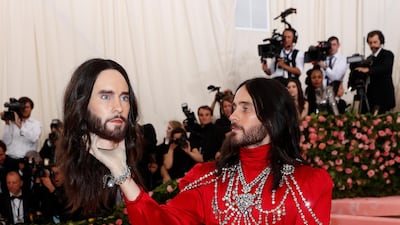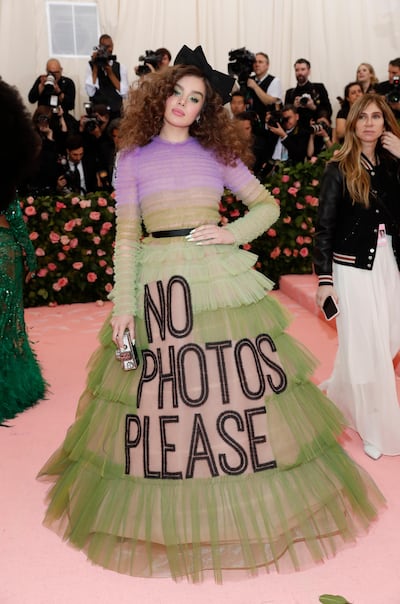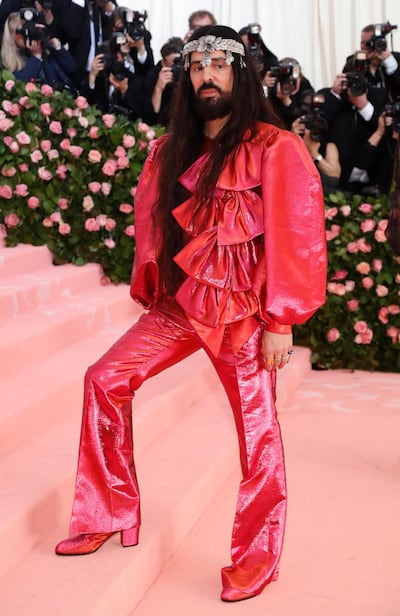When the Metropolitan Museum of Art's Costume Institute in New York announced that the theme of its 2019 gala fundraiser was going to be Camp: Notes on Fashion, it certainly raised a few eyebrows. But as the Met Gala's pink carpet demonstrated, camp, and all its inherently silly extravagance, is deeply embedded in American and British culture. Why else would Katy Perry arrive dressed as a crystal chandelier, or Jared Leto saunter around carrying his own waxwork head?
The theme took its name from writer Susan Sontag's 1964 essay Notes on Camp, in which she wrote: "What is most beautiful in virile men is something feminine, what is most beautiful in feminine women is something masculine ... allied to the camp taste of the androgynous ... Indeed the essence of camp is its love of the unnatural: of artifice and exaggeration."
That love of artifice first appeared in 1671, when the great French playwright and actor Moliere wrote how one should “camp about on one leg. Strut like a comedy king.” Molière was known for his farces and tragicomedies, and one can only assume that he meant camp to be humorous, entertaining, and to contain an element of playing to the crowd.
A couple of centuries later, the word entered the English language (from the French “se camper”, meaning “to pose in an exaggerated fashion”). An entry in the 1909 Oxford English Dictionary described camp as “ostentatious, exaggerated, affected, theatrical; effeminate”, a view that was broadly echoed in J Redding Ware’s dictionary of the same year, which listed the word to mean “actions and gestures of exaggerated emphasis”.
From that point on, it seems camp has been wholeheartedly absorbed into English-speaking culture. Since it began in 1895, the finale to the British classical music season, The Last Night of the Proms, has been a celebration of nostalgia, camp and pastiche, with plenty of rousing songs and tearful flag-waving.
The theatrical tradition of music halls, which eventually segued into early cinema, was rife with camp. Think of the silent films of Laurel and Hardy or Buster Keaton. Screen stars such as Marlene Dietrich (who dressed in masculine top hat and tails for the 1930 film Morocco), Joan Crawford and Mae West, who were adored for their arch replies, while even Marilyn Monroe in the 1950s understood the power of pastiche, creating an exaggerated version of herself.
With the arrival of colour television came Batman (1966-1968), starring Adam West, who played the lead, not as the sinister character of the comic books, but as an over-the-top, cheesy-lines-to-camera, Technicolor hero.
The Addams Family (1964-1966) followed suit, as did Lost in Space (1965-1968) with its hammy lines and corny robots. The 1970s saw the arrival of Charlie's Angels (1976-1981), Fantasy Island (1977-1984) and the hilariously terrible CHiPS (1977-1983), which saw two policemen endlessly driving around in sunglasses on motorbikes.
When Dallas hit the small screen in 1978, its overblown hysteria was an instant smash, a recipe copied almost verbatim by Dynasty (1981) and starring the queen of camp herself: Joan Collins. Cinema, too, embraced the idea, with films such as The Rocky Horror Picture Show (1975) and John Waters's Hairspray (1988), and The Adventures of Priscilla, Queen of the Desert (1994), while the field of music has given us superbly drama-laden figures such as Freddie Mercury, Elton John, David Bowie and Kiss, who paraded about in gloriously ridiculous stage make-up.
The Eurovision Song Contest, which may have genuinely started as continental talent search in 956 had, by the 1970s, descended into camp parody, through the likes of Abba and their silvery batwing jumpsuits and platform boots. Raised on a diet of Monty Python, Carry On films and Little Britain, figures such as Graham Norton, Cher, Kylie Minogue and Dolly Parton are held by many as national treasures for their cheerful ostentation.
It’s a quality that perfectly fits Sontag’s words that camp is “good because it’s awful”, something Monday’s Met Gala outfits, including the one worn by Gucci’s Alessandro Michele, amply proved.



